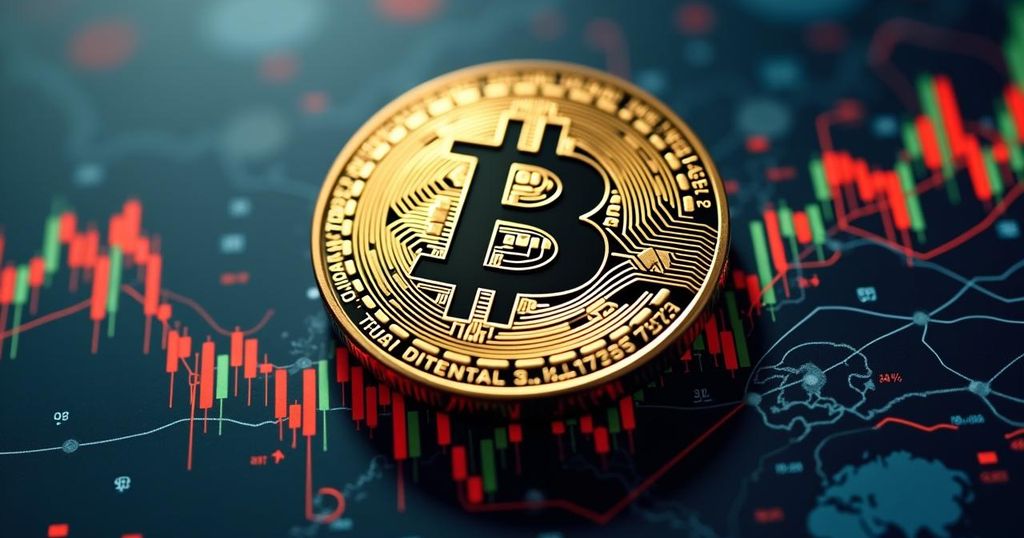As Israel-Iran Tensions Escalate, Bitcoin’s Role as a Safe Haven Under Scrutiny
On Tuesday, Bitcoin’s price fell sharply to $61,300, coinciding with missile strikes on Israel amid rising tensions with Iran. While some see potential for Bitcoin as a safe haven asset in the long term, current investor behavior favors traditional assets like gold and U.S. Treasury bonds during times of geopolitical strife. Analysts suggest that Bitcoin’s historical performance post-conflict may improve, though its immediate reaction reflects ongoing volatility.
On Tuesday, as missile strikes on Israel heightened tensions, the price of Bitcoin exhibited volatility, dropping by 3.2% to $61,300, the lowest it has been in two weeks, only to recover slightly to $62,200 later in the day. This decline coincided with a warning from the United States regarding an impending missile strike from Iran, which was subsequently confirmed by the Iranian Mission to the United Nations. Despite Bitcoin’s reputation as a store of value amidst inflationary pressures, it has not consistently proven itself as a safe asset during geopolitical tensions, according to Zach Pandl, Managing Director of Research at Grayscale Investments. “Investors who are concerned about high geopolitical risks are, for now, still reaching for the traditional instruments,” he stated, highlighting the preference for gold and U.S. Treasury bonds over cryptocurrency in such uncertain times. While Tuesday’s drop was pronounced, Pandl suggested that Bitcoin’s status as a flight-to-quality asset could evolve as its adoption increases worldwide. He noted, “In the longer term, when Bitcoin is widely held around the world and a reserve asset for central banks and governments, it may also be a common flight-to-quality asset.” Currently, however, Bitcoin remains in an early developmental stage compared to more established assets like treasury bonds or gold. Amidst the growing concerns over escalating violence in the Middle East, with fatal consequences from Israeli airstrikes in Lebanon following the killing of a key Hezbollah figure, Bitcoin’s performance remains under scrutiny. The correlation between geopolitical events and Bitcoin’s pricing is noteworthy, as André Dragosch of Bitwise observed that Bitcoin has historically responded well after major geopolitical tensions, asserting, “geopolitical news should generally be faded.” Furthermore, the uptick in oil prices, which surged 3.6% to over $70 a barrel, alongside a 1.3% increase in gold prices, indicates a broader market reaction to geopolitical instability. The U.S. Dollar Index also rose by 0.5%, contrasting the recent decline in the dollar’s strength. Investors are anxiously considering how inflation might affect Federal Reserve policies, especially in light of significant stimulus in China, which could further impact oil demand. Historically, Bitcoin has shown susceptibility to geopolitical shocks, as seen during the recent missile strikes in April and the immediate repercussions of Russia’s invasion of Ukraine in February 2022, which resulted in a considerable drop in Bitcoin’s value. Therefore, while some analysts project a long-term role for Bitcoin as a hedge against volatility, its current performance and investor behavior reflect a cautious outlook.
The article discusses the impact of geopolitical tensions, specifically between Israel and Iran, on the price of Bitcoin, a cryptocurrency often viewed as a potential safe haven during economic uncertainty. The piece conveys how Bitcoin’s price reacted to news of missile strikes and threats between these nations, emphasizing its fluctuating role as a store of value compared to traditional assets like gold and U.S. Treasury bonds. It also considers the implications of geopolitical events on broader financial markets, including oil and gold prices, and examines Bitcoin’s historical resilience or vulnerability during similar crises.
In conclusion, the current geopolitical tensions, particularly those involving Israel and Iran, have significantly affected Bitcoin’s pricing. While the cryptocurrency has gained attention for its potential as a hedge against inflation, it has not yet established itself as a reliable safe haven during times of geopolitical instability. Future developments in Bitcoin’s adoption and its evolution as a reserve asset may alter its role in such contexts, but for now, traditional assets continue to dominate investor preferences amid uncertain global conditions.
Original Source: decrypt.co







Post Comment